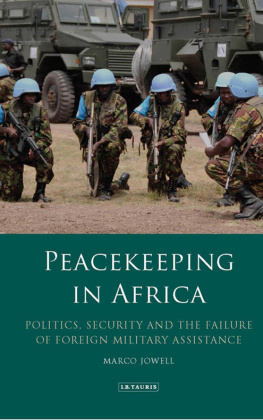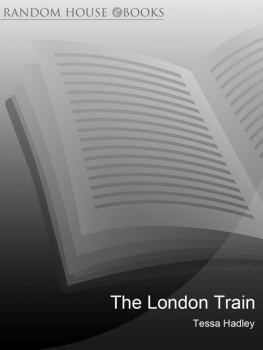HAUS CURIOSITIES
The Power of Politicians
About the Contributors
Claire Foster-Gilbert is the founder director of the Westminster Abbey Institute. A current and former member of numerous ethics committees, Dr Foster-Gilbert has played an instrumental role in the medical research ethics field, and has led efforts to shift the Churchs thinking on environmental issues.
Frances DSouza is a British scientist and life peer, and was Lord Speaker in the House of Lords between 2011 and 2016. Baroness DSouza was previously a lecturer at Oxford Brookes University and the London School of Economics, and was director of the human rights charities Article 19 and the Redress Trust.
Tessa Jowell was the Member of Parliament for Dulwich and West Norwood for 23 years. Baroness Jowell also held several major government ministerial and opposition positions, including Secretary of State for Culture, Media and Sport (200107) and Minister for the Olympics (200510).
First published by Haus Publishing in 2018
4 Cinnamon Row
London SW11 3TW
www.hauspublishing.com
Copyright Westminster Abbey, 2018
The right of the author to be identified as the author
of this work has been asserted in accordance with
the Copyright, Designs and Patents Act 1988
A CIP catalogue record for this book is
available from the British Library
Print ISBN: 978-1-912208-07-4
Ebook ISBN: 978-1-912208-08-1
Typeset in Garamond by MacGuru Ltd
Printed in Spain
All rights reserved
Introduction
In 2015 and 2016 Westminster Abbey Institute held a series of dialogues on the subject of power as it is exercised in the institutions of Government, Parliament, the Judiciary and the media. This little book is based upon the dialogue about the power of politicians. By way of introduction I will explain why Westminster Abbey would think it important to host such a dialogue; explore some basic questions about who MPs are, what they are for and how they are perceived; and look at the ways in which Baroness Jowell interpreted her role as she navigated the moral challenges that beset the life of an elected politician.
Just as the editing of this volume was being completed, on 12th May, 2018, Tessa Jowell died of a brain tumour. The courage with which she faced her illness, and the way in which she turned it into a means to serve others, were characteristic. The redoubtable woman who is evident in the words of this dialogue is just the same.
Within the ancient walls of Westminster Abbey, the prayers of those seeking wisdom and forgiveness for themselves and justice and peace for the world have echoed through a thousand years of turbulent history. Whatever else it might have stood for, because it is imbued with centuries of this attentive meditation, Westminster Abbey can and should now offer a place of profound questioning and reflection in the heart of Westminster. Today, the Abbey finds itself on the south side of Parliament Square, with the Houses of Parliament to the east, the Treasury and all of Whitehall to the north and the Supreme Court to the west. It sits at the table, then, with the Legislature, the Executive and the Judiciary: the institutions and people who serve the nation. This geographical privilege belies the fact that the Abbey has little access as of right to the corridors of power. However, when Westminster Abbey Institute was established in 2013 to support the public service of its immediate neighbours, it was welcomed. There was a thirst for depth in the increasingly stretched and stressed body of public servants, like a brittle sponge that needed watering, and the Abbey was acknowledged to be a well that might quench that thirst. Through its Institute, Westminster Abbey tries to bring out into the public domain the rich treasury it has nurtured for so long. Explicitly serving people of all faiths and none, the Institute draws on the Abbeys resources of spirituality and scholarship rooted in its Christian tradition. Out of this deep root comes a disposition to serve the good and the true, and this has forged the Institutes aims: to nurture and revitalise moral and spiritual values in public life; to inspire the vocation to public service in those working in Westminster and Whitehall; to identify and defend what is morally healthy in their institutions; and to promote a wider understanding of public service.
The idea for the programme of dialogues on the nature of power exercised around Parliament Square was partly generated by the play Protest Song by Tim Price, which depicts a homeless man politicised by the Occupy movement when it established itself on his patch outside St Pauls Cathedral in 201011. The play explores Occupys notion of power as being entirely in the hands of 1% of the people, while 99% remain victims of the 1%s imagined unscrupulousness. In the play, the 1% consists of the business and political classes. But the Institutes encounters with those of this so-called 1% working around Parliament Square have revealed human beings who, much of the time, feel anything but powerful. And yet it is these people and their institutions who run the country. So, what is the nature of the power of the public servant, and to what end should it be exercised? With these questions in mind we embarked upon a series of dialogues exploring power as a force for good as it is experienced by the people working within the constraints of the UK constitution.
If there is something a politician really believes should be done for the good of the country, how within the ecology of Westminster do they make it happen? Ruling power is located among balancing forces of party politics, Cabinet responsibilities, the Prime Ministers favour, the need to gain and retain votes, the politically impartial support of civil servants, public opinion as it is expressed through traditional and social media and events, dear boy, events. To what extent do the different forces support, curtail, outweigh or even completely scupper each other in the shared attempt to express and enact what should be done for the country? The UK constitution puts elected political leaders at its heart and this is where, rightly, responsibility finally rests for the decisions, called policies, that are brought into being. The volatility that is inherent in democracy as MPs inevitably have to attend to being selected, elected and re-elected is then given considerable stabilising ballast by the constitutional provision of a non-political Civil Service, Judiciary, Armed Forces and Security Services and an appointed House of Lords, all of whom, together with MPs themselves, owe loyalty first of all to the Crown, which has no direct power at all. The genius of the system is that no one can become a tyrant, but arguably the very same system prevents anything getting done.
The system of parliamentary democracy within which Tessa Jowell operated, as an MP for 23 years and latterly as a Peer, has evolved over seven centuries, and is still evolving. Parliament consists of two houses, the House of Commons and the House of Lords. The 650 members of the House of Commons, called Members of Parliament, are elected to their places, each representing a constituency. The whole of the UK is divided into these 650 constituencies, so no one is without their MP to represent them, and every adult, with a very few exceptions, is entitled to vote for their MP. Members of the House of Lords (Peers) are appointed, with the exception (somewhat ironically) of 90 hereditary Peers who elect from their own number. Legislation is created in the House of Commons and can be amended by the unelected House of Lords, but it cannot usually be overturned. Nearly all MPs are members of a political party, and the party which gains a majority of MPs in the House of Commons forms Her Majestys Government, remaining in power until the next election, with the party leader becoming Prime Minister. All the other Ministers who form the Cabinet and run the different Government Departments are chosen by the Prime Minister from among the MPs in their Parliamentary party, and also sometimes from the Lords. Each Government Department (the Home Office; the Treasury; the Department for Environment, Food and Rural Affairs; etc) has one Secretary of State and several junior Ministers. The Secretaries of State meet together regularly as the Cabinet, by whom policies are decided, and they are also known as the Front Bench that is, they sit on the front benches in the House of Commons debating Chamber. The political party with the second highest number of MPs forms Her Majestys Loyal Opposition. MPs in opposition will be appointed to shadow offices, so there will be a Shadow Home Secretary, a Shadow Foreign Secretary, etc. This Shadow Cabinet will sit on the opposition front bench facing the Government front bench in the Chamber.













